More than 30 years ago, the 1992 nickel was struck by the US Mint. It is one of the many series of Jefferson nickel that has proven to be one of the most popular and widely circulated coins in the US.
If you want to complete your Jefferson nickel collection, you’ve got to learn more about the 1992 nickel, its composition, historical significance, and value.
What Is the 1992 Jefferson Nickel Made Of?
The 1992 nickel is made of 75% copper and 25% nickel. So far, the only time that this composition changed was from mid-1942 to 1945, which was the year when the United States was at war with the Axis Powers.
Because nickel was an important war raw material, Congress asked the US Mint to reduce or completely remove the nickel from US coins temporarily. This resulted in a composition of 56% copper, 35% silver, and 9% manganese. These coins are now known as the “Wartime Nickels.”
The value of a nickel is 5 cents. Its mass is 5 grams, and its diameter is 21.21 mm. It also has a plain edge.
The Jefferson nickel was first struck in 1938. The US Mint was eager to replace the Buffalo nickel. While the Buffalo nickel looks nice and beautiful, it is difficult to produce. The more the US Mint tried to produce detailed Buffalo nickels, the faster the die wore out and broke.
So, after 25 years, the Buffalo nickel can be replaced by a new design, and the Jefferson nickel was born.
Choosing the design wasn’t easy. So, the US Mint held a design competition, and the winner’s design will not only grace the nickel coin but also receive a prize of $1,000, which was, at that time, a huge amount of money.
The US Mint specifically instructed contestants to include Jefferson’s portrait on the obverse (head) and the Monticello on the reverse (tail). After a few weeks, Felix Schlag won the competition.
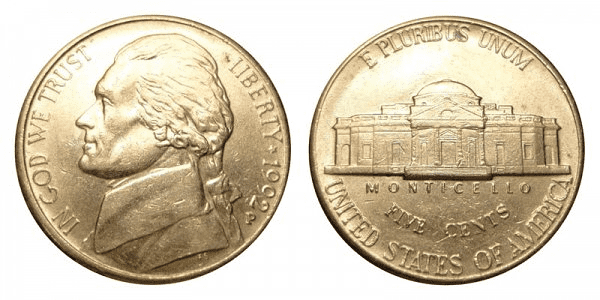
On the obverse, you’ll find the face of the third president of the United States and founding father, Thomas Jefferson. Inscriptions include the following:
- LIBERTY
- IN GOD WE TRUST
- 1992
- Mint mark
- Designer’s initials
On the reverse, you’ll find the Monticello mansion, also Jefferson’s residence. Inscriptions include the following:
- E PLURIBUS UNUM
- MONTICELLO
- FIVE CENTS
- UNITED STATES OF AMERICA
1992 Jefferson Nickel Varieties
There are three standard varieties of the 1992 Jefferson nickels. The main difference among these varieties is their mint mark. Mint marks indicate where the coin was struck.
Here is a summary of the 1992 Jefferson Nickel Varieties, along with their mintage:
| Variety | Mint Location | Mintage |
| 1992 D Jefferson Nickel | Denver | 450,565,113 |
| 1992 S Proof Jefferson Nickel | San Francisco | 4,176,560 |
| 1992 P Jefferson Nickel | Philadelphia | 399,552,000 |
| Total | 854,293,673 |
The production of the Jefferson nickel dipped in 1992. The same thing happened in 1993. From 1988 to 1991, the US Mint produced more than a billion nickel coins, which didn’t happen in 1992.
Here’s a deeper look at each of the 1992 Jefferson Nickel varieties.
1992 D Jefferson Nickel
Year of minting: 1992
Mint Mark: D
Minted in: Denver
Quantity produced: 450,565,113
Face Value: $0.05
Price: $0.28 to $1.13 (circulated condition)
Mass: 5.00 grams
Edge: Plain
Designer: Felix Schlag
Composition: 75% Copper, 25% Nickel
Diameter: 21.20 millimeters
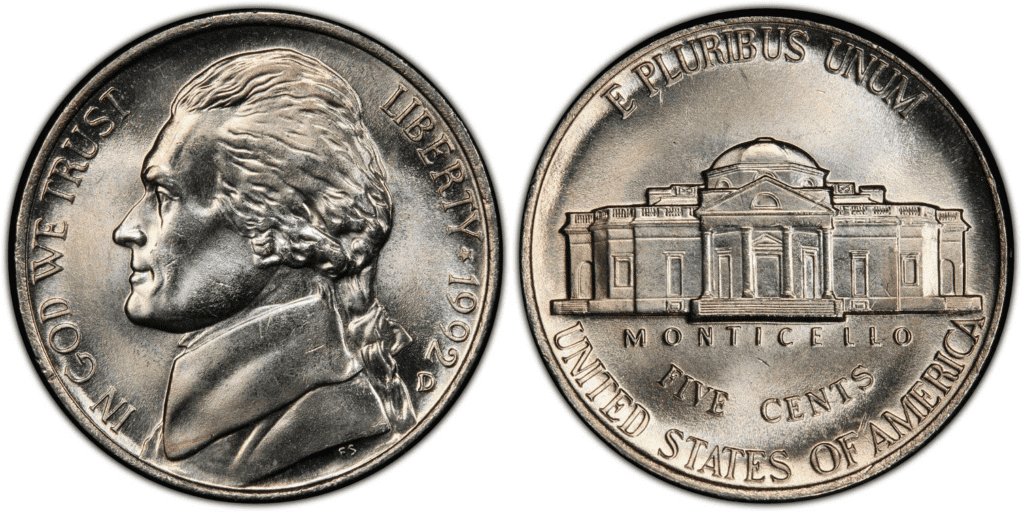
The Denver Mint produced more than 450 million nickels in 1992. This made the 1992-D nickel the most abundant variety in the 1992 nickel series. Circulated coins may be just between $0.10 and $0.20.
1992 S Jefferson Nickel
Year of minting: 1992
Mint Mark: S
Minted in: San Francisco
Quantity produced: 4,176,560
Face Value: $0.05
Price: $3.89 or more (Mint State)
Mass: 5.00 grams
Edge: Plain
Designer: Felix Schlag
Composition: 75% Copper, 25% Nickel
Diameter: 21.20 millimeters
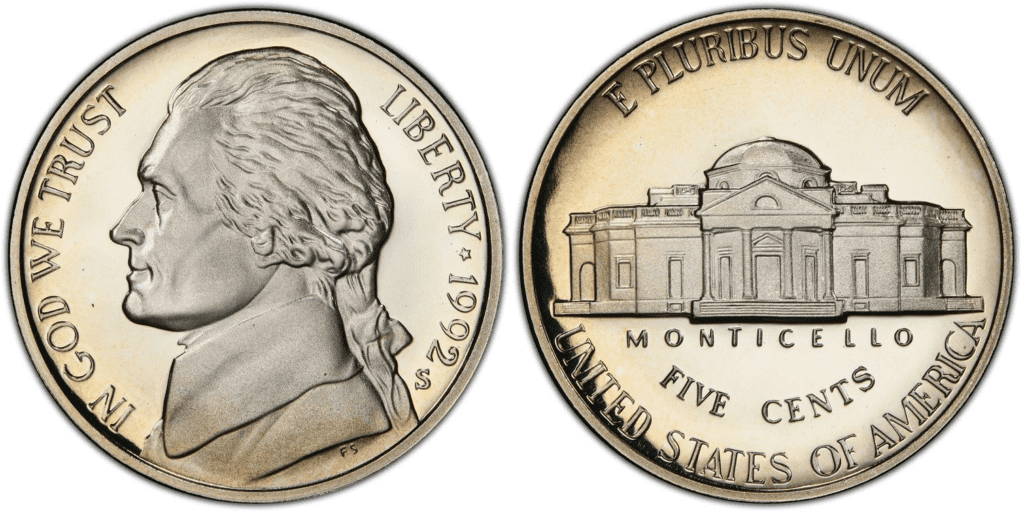
The San Francisco Mint produced more than 4 million proof coins. What’s interesting about the 1992-S proof coins is that they are the most abundant variety of S-proof coins for nickel coins. Usually, the San Francisco Mint can only produce about 2 million proof coins, but this was different in 1992.
The price of the 1992-S nickels can be around $3 to $4. Proof coins are shinier and more beautiful than standard coins. They are usually made for collectors and not for the public.
1992 P Jefferson Nickel
Year of minting: 1992
Mint Mark: P
Minted in: Philadelphia
Quantity produced: 399,552,000
Face Value: $0.05
Price: $1.71 to $2.81 (circulated condition)
Mass: 5.00 grams
Edge: Plain
Designer: Felix Schlag
Composition: 75% Copper, 25% Nickel
Diameter: 21.20 millimeters
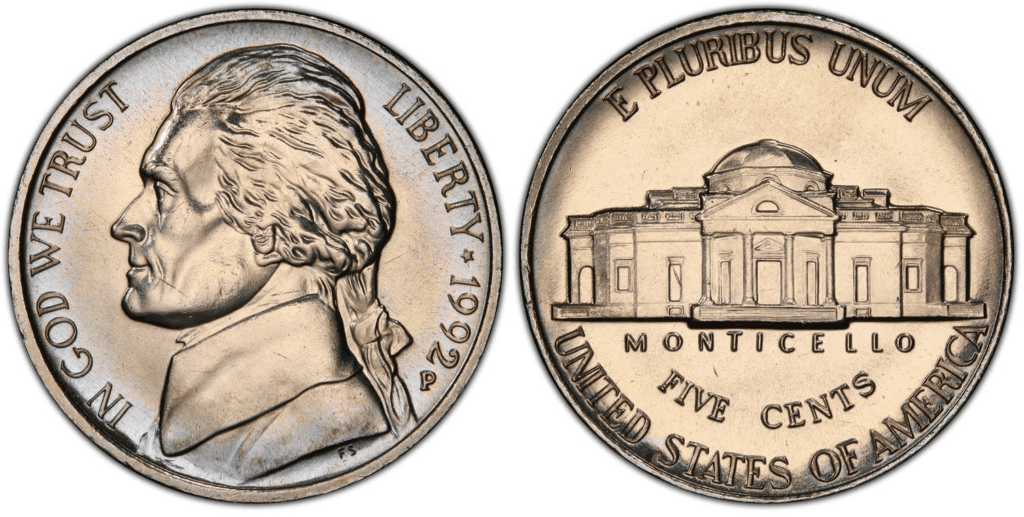
The Philadelphia Mint produced almost 400 million nickels in 1992. Usually, it is the Philadelphia Mint that produces the most number of coins for a given variety. However, 1992 was different. You will see a huge drop in nickel production by the Philadelphia Mint during this year.
Just to give you an example, the Philadelphia Mint produced more than 600 million nickels in 1990 and 1991.
You should be able to sell this coin for around $1.71 to $2.81.
List Of 1992 Jefferson Nickel Errors
The US Mint produced more than 850 million Jefferson nickels in 1992. Imagine producing thousands of nickels in a single day. So, error coins are something you would naturally expect.
There are different error coins in the 1992 Jefferson nickel series. Here are some of them:
Lamination error
A lamination error happens when foreign material is mixed up in the original copper and nickel composition. Because the foreign material doesn’t mix well with copper and nickel, a part of the coin looks different.
Here’s an of a 1992 nickel lamination error example:
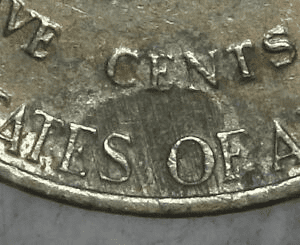
Clad error
The 5-cent coin is clad with nickel. However, sometimes, the cladding doesn’t completely cover the coin. Thus, you’ll find some portion of the coin with a different color.
Here’s a 1992 nickel clad error example:
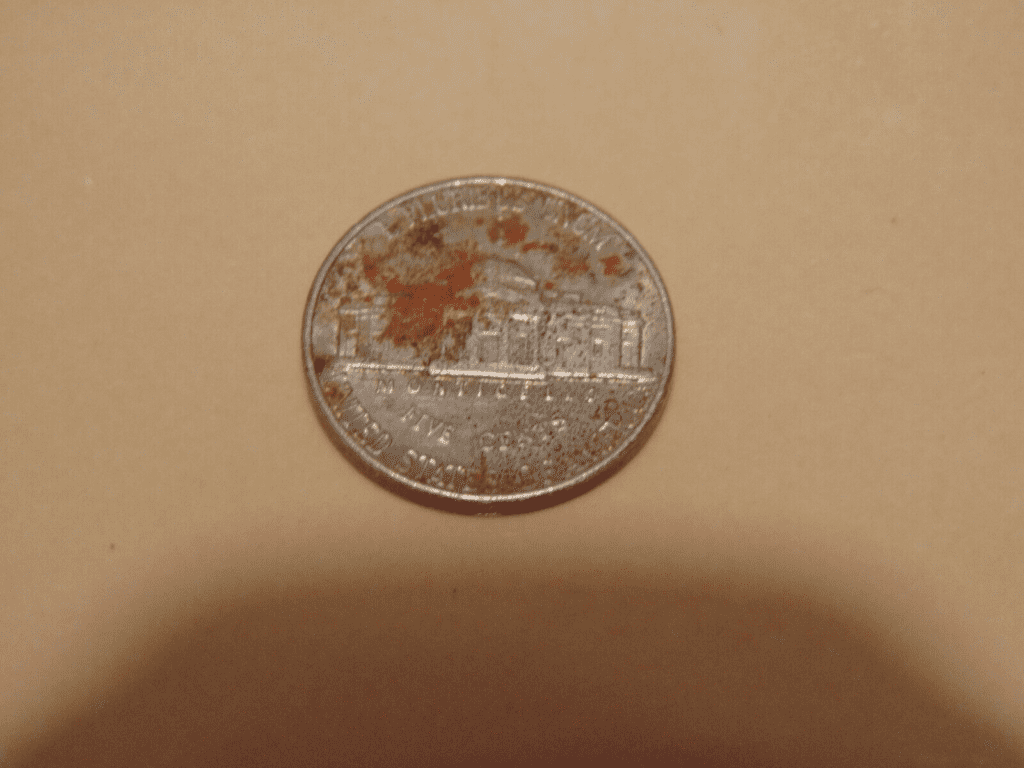
Die crack
Because the die hits the planchet multiple times, it undergoes wear and tear. As a result, it can break over time, and when a broken die hits the coin, it leaves a mark just like this one:
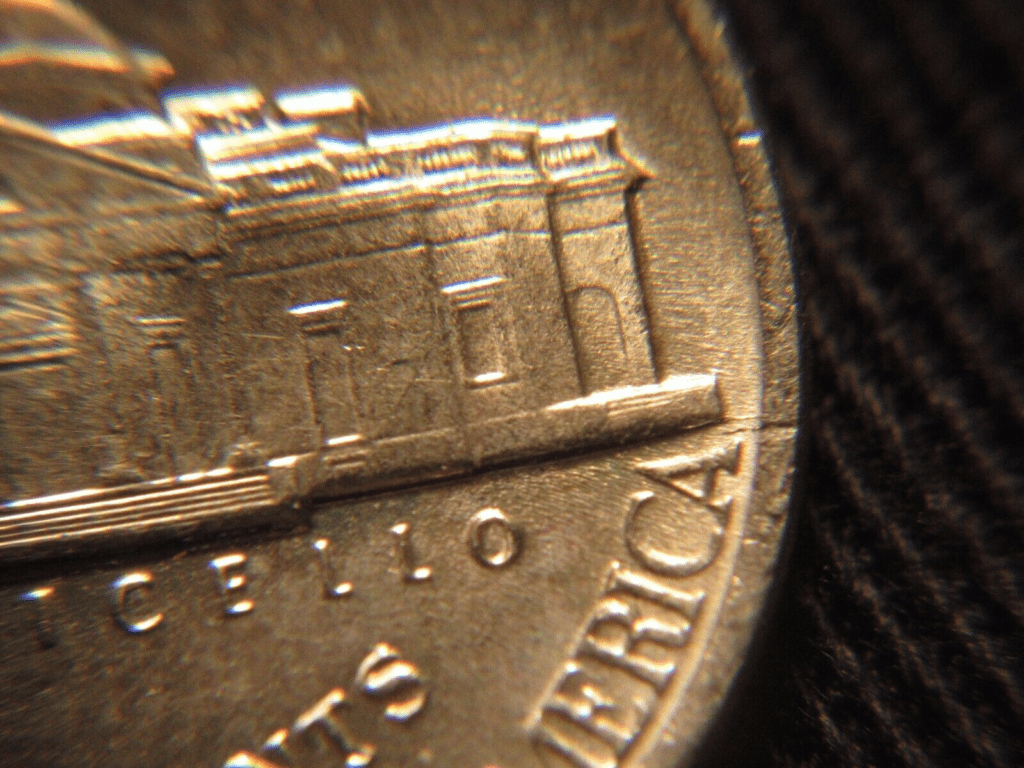
Doubled die obverse (DDO) or doubled die reverse (DDR)
The die hits the coin twice. If the second strike hits at a slightly different angle, then you’ll find some doubling in the coin’s engraved elements. Here’s an example of a DDR 1992 nickel error:
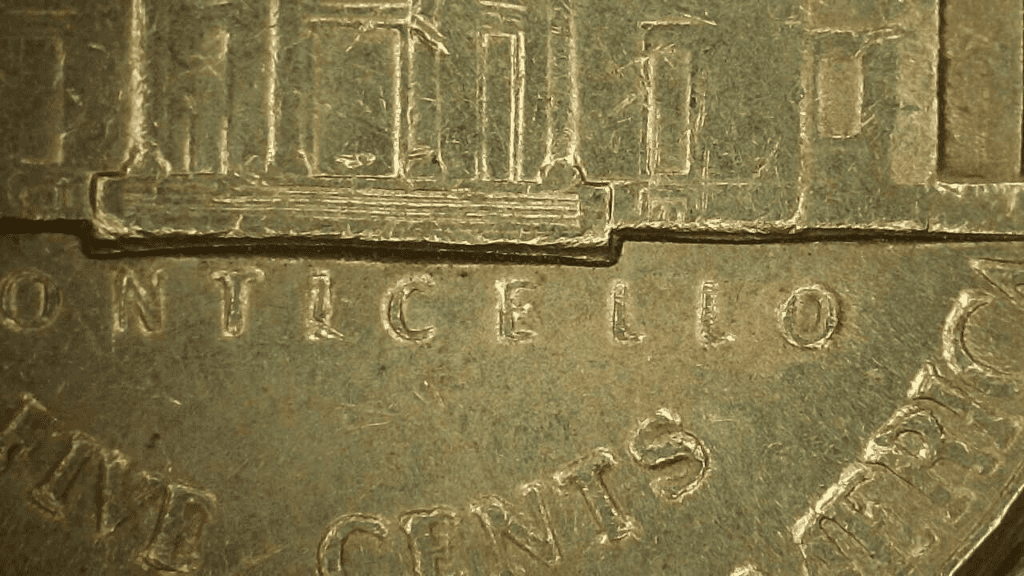
Strike-through error
The strike-through error happens when a foreign material gets stuck between the die and the planchet. So, when the die hits the planchet, the die strikes through the foreign material, which can be anything like grease, cloth, and metal clippings.
Here’s an example of a strike-through error that involves grease:
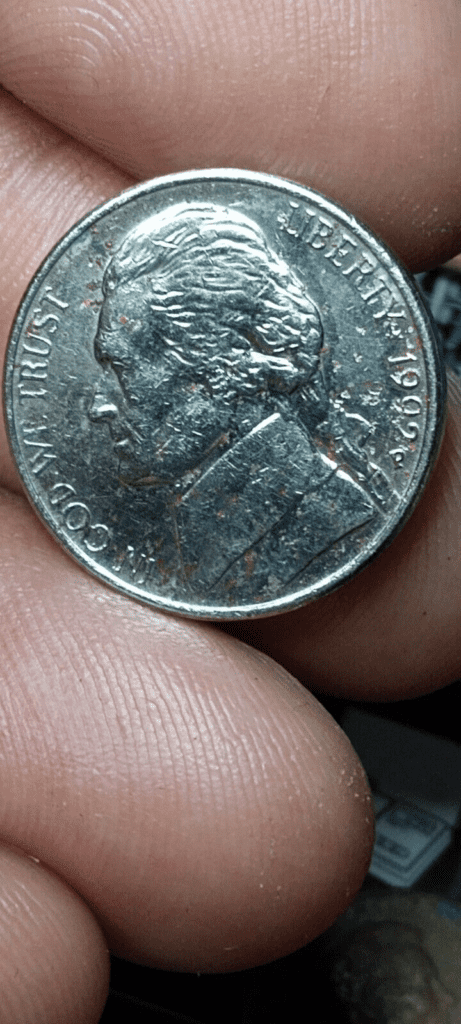
Filled mint mark
The filled mint mark error happens when the mint mark isn’t as detailed as it should be. Instead, it looks like it is filled just like this one:
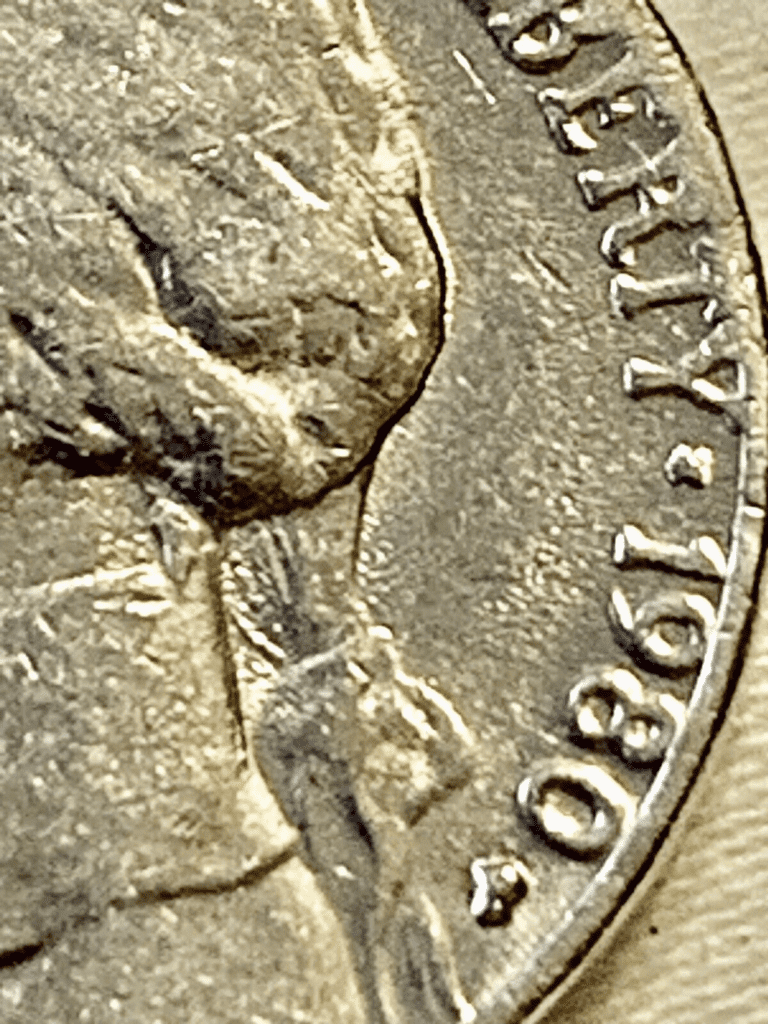
How Much Is 1992 Jefferson Nickel Worth Today?
The 1992 Jefferson was just made with nickel and copper. There’s no precious metal in it. So, it’s not valuable and trades at face value, which is 5 cents. The melt value is slightly higher at $0.0714.
According to NGC, a 1992 Jefferson nickel in circulated condition can be sold for $0.10 and $0.20. However, if the coin is uncirculated, it can be sold for about $1.71 to $2.81. Proof coins are more valuable at $3.89.
The 1992 Jefferson nickel doesn’t sound like a valuable coin in terms of the face value and melt value. Nevertheless, you should see the chart below that lists the auction records for each variety:
| Coin | Condition | Grade | Sold date | Sold by | Value |
| 1992 D Jefferson Nickel | Superb Gem Uncirculated | MS 67 (Full Step) | January 6, 2016 | Heritage Auctions | $3,760 |
| 1992 P Jefferson Nickel | Superb Gem Uncirculated – Full Step | MS 67 | February 3, 2010 | Heritage Auctions | $1,725 |
| 1992 S Proof Jefferson Nickel | Perfect Uncirculated – Full Steps | PR 70 (Deep Cameo) | July 11, 2013 | Heritage Auctions | $940 |
The table proves that there are still 1992 nickels that are worth a lot of money. They can even be worth thousands of dollars. Moreover, you can also check error coins. Some of these coins are valued at a hundred dollars.
How Does The Grading System Work?
The 1992 Jefferson 5-cent coin is graded based on the Sheldon scale, a 70-point grading scale. The higher the number, the higher the grade is.
An uncirculated 5-cent coin from 1992 can either be MS or PR. Coins made for circulation are referred to as MS, while coins made for collectors are referred to as PR.
The perfect score is MS70 or PR70. It is rare to find nickels with a perfect score. In 2013, a PR-70 nickel was sold for almost a thousand dollars.
To officially grade a coin, you would need to seek the help of professional grading service providers such as PCGS and NGC.
Where To Buy Or Sell 1992 Jefferson Nickel?
You should easily find 1992 Jefferson nickels because of their massive mintage. You can visit a coin shop or antique store. You can also join auctions, where some of the most beautiful and rarest 1992 Jefferson nickels are offered.
If you want a quick and easy way of finding a Jefferson nickel from 1992, you can use the Internet. You can do a Google search and find websites that specialize in selling and buying 1992 nickels. You can also head directly to Amazon and eBay. These marketplace platforms can both help you sell and buy 1992 Jefferson nickels.
FAQs
Where is the mint mark on a 1992 nickel?
The mint mark on a 1992 nickel is found on the obverse side of the coin. You should easily find it next to the year of minting, 1992. Mint marks can be S, D, or P.
Who is on the 1992 nickel?
Thomas Jefferson, the third president of the United States and one of its founding fathers, is the one in the 1992 nickel.
How much is a 1992 copper-nickel worth?
The 1992 copper-nickel is worth as much as its face value, which is 5 cents. Some rarer 1992 nickels can be worth hundreds or thousands of dollars. For example, a 1992-D nickel was sold for $3,760 in 2016.
1991 Silver Eagle Value Guide
1991 Quarter Value Guide (Incld. Rare Varieties)
1992 Kennedy Half Dollar Value Guide
1992 Jefferson Nickel Value Guide
1992 Roosevelt Dime Value Guide
1993 Jefferson Nickel Value Guide
1993 Quarter Value Guide (Incld. Rare Varieties)
